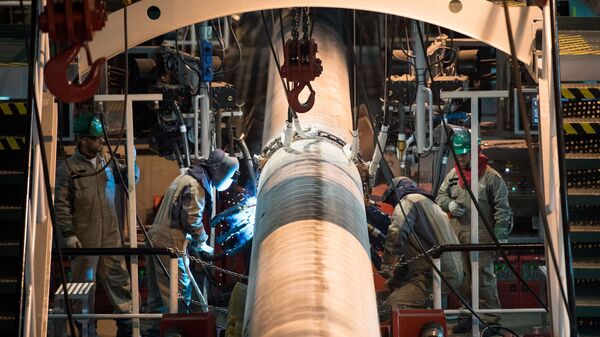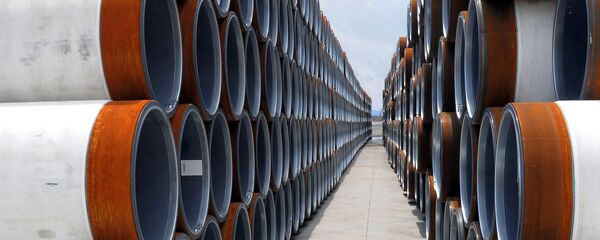Russia’s energy giant Gazprom has already laid over 600 kilometers of pipes for the Turkish Stream gas pipeline, a company spokesperson said.
"The current construction pace is nearly four kilometers a day. This is very fast," Sergei Kupriyanov said in interview with the Rossiya 24 broadcaster.
He added that the work is "proceeding at full speed" and that construction is likely to be completed according to schedule.
Competition for the European Market
Turkish Stream it is believed will further strengthen the role of Russian natural gas in Europe amid recent attempts by the United States to get a piece of the European energy pie, including with the deliveries of its liquefied natural gas (LNG) to some European countries. In late November, Washington once again expressed its objections to the Turkish Stream.
Commenting on the issue, Tolga Demityol, a senior energy researcher at the Istanbul-based Altinbas University, pointed to the reasons behind Washington’s concerns over the new gas pipeline.
"Such projects as Turkish Stream and Nord Stream 2 are Russia’s trump cards for maintaining its leadership in the European gas market, in opposition to American LNG," Demityol said in an interview with Sputnik Turkey.
The analyst also noted that Turkey has not joined the recent US sanctions against Russia, including in energy, and has "the potential to be an important player amid the geopolitical rivalry between the two major powers."
During a December meeting with his Turkish counterpart Recep Tayyip Erdogan, Russian President Vladimir Putin commented on the Turkish Stream, saying the project was very important in terms of Turkey’s energy security.
READ MORE: How Turkish Stream Project Reflects 'Geopolitics of Gas Pipes'
On August 2, US President Donald Trump signed a bill imposing sweeping sanctions on Russia, Iran and North Korea. In particular, the anti-Russia sanctions target the country's defense and economic sectors, restrict dealings with Russian banks and energy companies, as well as counteract the construction of the Nord Stream 2 pipeline.
The sanctions raised concerns that they could also challenge the construction of the Turkish Stream. However, Russian Energy Minister Alexander Novak said the project would be implemented on time regardless of the sanctions.
Turkey's Dream of Becoming a Gas Hub
Commenting further, Demityol underscored that the Turkish Stream project is both politically and economically important for Ankara.
"The Turkish Stream includes two lines with a combined annual capacity of 31.5 billion cubic meters and 50 percent of the supplies will be delivered to the consumer market. If at the end of 2019 the transit agreement between Russia and Ukraine is not extended, the losses will be compensated via Turkish Stream. In terms of curbing the risks related to supplies via Ukraine, the new pipeline is very important for Turkey’s energy security."
"This is why Turkey needs to formulate legal regulations related to the activities in energy markets," the analyst pointed out.
What is also important, according to Demityol, is the creation of a Russian-Turkish joint company to operate gas supplies to third markets.
"Only if all of these conditions are met will Turkey’s idea of becoming a gas hub come to life. Otherwise, Ankara will play the role of a corridor for Russian gas," the analyst concluded.
The Turkish Stream project presupposes the construction of two conduits of the main gas pipeline along the bottom of the Black Sea, with an annual capacity of 15.75 billion cubic meters of gas each. One route is designed to deliver gas directly to the Turkish market and the other is for transit gas supplies through Turkey to European countries.
The construction of the first portion was launched in May and is expected to be put into operation in March 2018, while the second – in 2019.
The views and opinions expressed in this article are those of the speaker and do not necessarily reflect the position of Sputnik.


